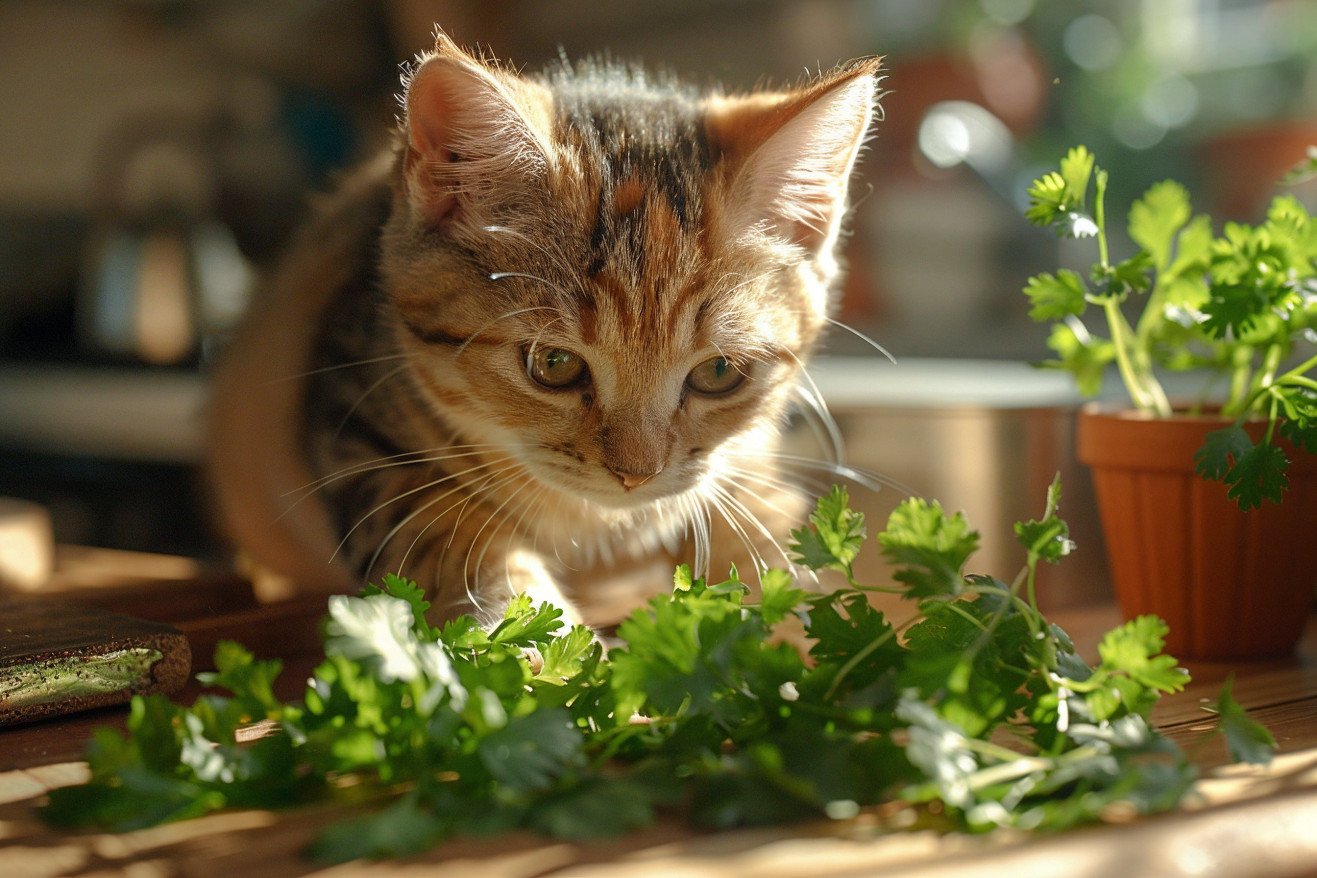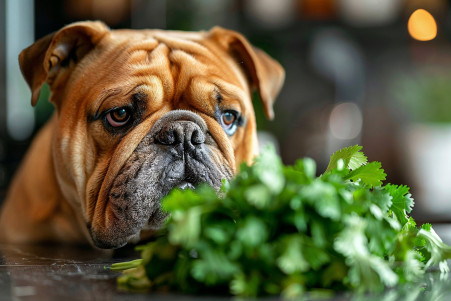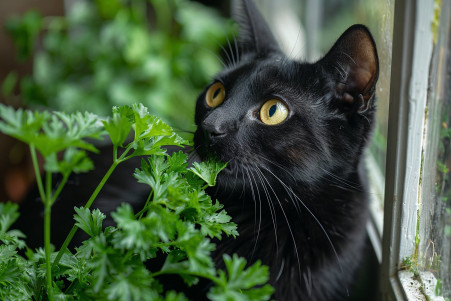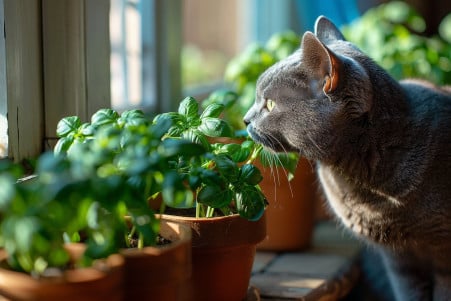Can Cats Eat Cilantro? Safe Herbs for Feline Diets Explained
17 February 2024 • Updated 16 February 2024

Cilantro is a great way to add a little extra flavor to a dish, but can you use it as a garnish for your feline friend? Yes, cats can eat cilantro in small amounts. Cilantro is not poisonous to cats and it does have some potential health benefits, including antioxidants.
That said, because cats are obligate carnivores that need to get most of their nutrition from meat, cilantro should be reserved for special occasions to avoid upsetting their stomachs.
This article will use veterinary knowledge and nutritional research to determine how cilantro can be used in a cat’s diet. We’ll look at the nutritional content of cilantro in relation to what cats need and consider how it might impact their health. By the end, you’ll know how to make sure your cat gets the meat-based diet they need while still giving them the occasional plant-based treat.
Can cats eat cilantro?
Why Cats Are Carnivores and What They Need to Eat
Cats are obligate carnivores, which means they have evolved to eat a diet that consists mainly of meat. The biological and evolutionary history of cats has led to specific nutritional requirements that can only be found in animal tissue, and these nutrients are necessary for their survival and overall health.
According to the Cornell University College of Veterinary Medicine, cats need a diet that is high in protein and includes essential nutrients like vitamins, minerals, fatty acids, and amino acids, all of which are found in animal-based foods.
Taurine and arachidonic acid are examples of essential nutrients that are vital to cats and, according to the Purina Institute, are only found in animal tissues. Plant-based foods are not important in a cat’s diet because cats don’t need carbohydrates and can’t digest plant materials as well as animal proteins.
If cats don’t get the animal-based diet they need, they can develop serious health problems like heart disease and blindness due to a taurine deficiency.
According to VCA Animal Hospitals, while cats may eat other things, including plant-based foods, these should be in small amounts and should not replace the animal protein that is essential to their unique dietary requirements. Making sure your cat gets a diet that includes the nutrients they need is essential to their health and well-being.
Cat Digestive System: Can Cats Eat Herbs Like Cilantro?
The anatomy of the cat digestive system clearly shows that cats are designed to eat meat. According to the Washington State University Veterinary Teaching Hospital, the cat digestive system includes organs like the stomach, which is highly acidic, and the short intestine, which are both well-suited to digesting proteins and fats.
In addition, Catit Magazine explains that cats don’t have digestive enzymes in their saliva, and the small intestine, which is covered in villi, is designed to absorb nutrients from animal products.
The liver and pancreas are important for digestion and metabolism, as the pancreas is involved in protein digestion and the liver metabolizes nutrients.
However, a study published in PMC explains that cats can have trouble digesting plant-based foods like cilantro because they have a limited ability to digest plant fibers. While the digestive system can tolerate some plant material, eating too much can lead to digestive upset because of the fermentation that occurs in the colon.
This is important information for cat parents to know when they’re thinking about adding herbs like cilantro to their cat’s diet. While herbs can be added to a cat’s diet, it’s important to make sure they’re added in small amounts and that the cat is closely monitored for any signs of a problem.
This will make it possible for cats to enjoy the variety that herbs can add to their diet while still making sure they’re eating in a way that’s in line with their carnivorous nature.
Nutritional Content of Cilantro and How It Can Help Cats
In addition to its bold taste, cilantro offers a variety of nutrients that may be appealing to cat owners who want to add more variety to their pets’ meals. It’s packed with antioxidants, vitamins, and minerals like folate, beta-carotene, magnesium, and lutein, according to Pet Friendly House. These nutrients have been shown to help with everything from vision to skin health in humans, and potentially in cats.
That said, cats are obligate carnivores, which means they have a low requirement for nutrients that come from plants. Cats can make their own vitamin C and need pre-formed vitamin A from animal sources, which means that the plant-based vitamins in cilantro may not be as helpful, according to Hepper.
While small amounts of cilantro can offer fiber and antioxidants, these are not necessary for cats and are in addition to their basic dietary requirements.
While a report from Litter-Robot says that cilantro is safe for cats, it’s important to introduce it to your pet slowly. Eating too much cilantro can lead to digestive issues, including diarrhea or gas, which can be especially problematic for cats because of their carnivorous digestive systems.
It’s important to use cilantro in moderation, and to make sure that it’s a small part of your cat’s diet to ensure that it doesn’t upset your pet’s stomach.
How Does Cilantro Compare to Other Herbs? Safety and Nutrition
In terms of herbs that you might want to give your cat, cilantro is known to be safe and non-toxic. The ASPCA lists cilantro as non-toxic to cats. On the other hand, other herbs that you might have in your kitchen, like chives and garlic, are toxic to cats and should be kept away from them.
While cilantro does have some nutritional benefits, especially in terms of vitamins and antioxidants, these are less important for cats, who are obligate carnivores and get their essential nutrients from animal protein.
In comparison to other herbs that are safe for cats, like dill or basil, cilantro is about the same in terms of safety, but like other herbs, it should be given to cats as an occasional treat, not a regular part of their diet.
As with any new food, including cilantro, you should introduce it to your cat’s diet slowly and in small amounts to make sure your cat doesn’t have a bad reaction to it. And as always, make sure that you’re meeting your cat’s basic nutritional needs first and using herbs like cilantro to add variety, not substance, to their diet. This will help ensure that your cat is healthy and satisfied with their diet.
How to Add Cilantro to Your Cat’s Diet: Tips from the Pros
If you decide to add cilantro to your cat’s diet, it’s important to do so carefully and with the guidance of a veterinarian. You should start by adding a small amount of cilantro to your cat’s diet as an occasional treat, rather than a regular part of their meals.
Both The Cat Bandit Blog and Pet Friendly House recommend using fresh cilantro leaves, as opposed to dried herbs or recipes that include other ingredients that are toxic to cats, such as onion and garlic.
It’s also important to pay close attention to how your cat reacts to the cilantro, as it could cause digestive issues or allergic reactions. Pet Friendly House notes that while cilantro can provide antioxidants and vitamins, it’s important to make sure it doesn’t lead to bloating, diarrhea, or vomiting, which can lead to dehydration, a serious issue for cats.
In general, vets recommend that you introduce new foods like cilantro to your cat’s diet slowly so that you can closely monitor how your cat responds to it.
Cat Bandit also recommends moderation, noting that too much cilantro can lead to liver damage or digestive issues in cats that are sensitive to it.
As a result, it’s important to make sure that you’re not only feeding your cat cilantro in small amounts but also that you’re feeding it to them infrequently. In general, it’s best to use cilantro as a garnish rather than a main ingredient.
And, as always, make sure to check with your vet before you make any changes to your cat’s diet to make sure that cilantro is a good addition to their diet and won’t interfere with their primary, meat-based diet.
Conclusion: Cilantro and Your Cat’s Diet
To sum up, cilantro is not harmful to cats and can be given to them in small amounts as a safe treat. As noted by Litter-Robot and emphasized by the ASPCA’s list of non-toxic plants, cilantro is safe for cats when given in moderation. However, it’s important to keep in mind that cats are obligate carnivores and their diets should be made up mostly of high-quality animal-based nutrients, as noted by Hepper.
While cilantro can be used to mix things up for your cat, it should not be used as a substitute for the essential nutrients that your cat gets from their primary animal-based diet. Your cat can have a sprig of cilantro here and there as a fun treat, but it should be considered just that—a treat, not a staple.
It’s important to make sure that your cat is getting the right nutrition to stay healthy and happy. You can help ensure that your cat is healthy and lives a long life by making sure that their diet is well-balanced and made up of the right species-appropriate foods.
As a result, while cilantro can be a fun treat for your inquisitive cat, their diet should be made up mostly of animal-based foods to meet their carnivorous requirements.


